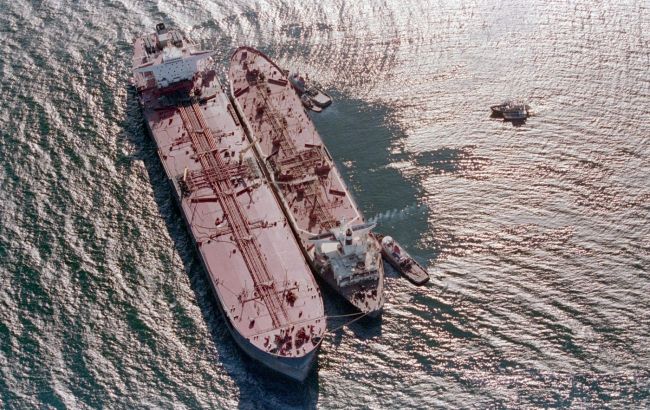Ukrainian intelligence uncovers illegal transfers of Russian oil near Greece
 Illustrative photo: Russia illegally transfers oil near Greece (Getty Images)
Illustrative photo: Russia illegally transfers oil near Greece (Getty Images)
An Aframax-class tanker without Western insurance has been illegally conducting ship-to-ship oil transfers in open waters since July 2024. The operations are reportedly taking place near the coasts of Greece and Cyprus, according to Ukraine's military intelligence (HUR).
"These covert transfers pose an environmental threat, help Russia obscure the origin of its oil, allow it to evade international oversight, and enable continued supply to third countries in violation of sanctions," the statement reads.
The HUR has released data on the vessel with IMO number 9247443, which is allegedly being used by Russia as a floating transfer hub for sanctioned oil shipments. The information was published on the War&Sanctions platform.
In addition, Ukrainian intelligence has made public details on 159 oil tankers - most of which belong to Russia's so-called "shadow fleet" - as well as data on 55 captains associated with these ships.
Altogether, the War&Sanctions database includes records on 577 tankers engaged in similar activities, with a combined deadweight tonnage exceeding 63 million metric tons.
Oil revenues fuel the war
According to the HUR, oil and gas exports remain a critical source of revenue for Russia in the fourth year of its full-scale invasion of Ukraine. It is estimated that in 2025, one-third of these revenues will be used to finance the war.
The shadow fleet is known to employ high-risk maritime practices, including disabling automatic identification systems, spoofing navigation data, conducting nighttime transfers without lights, using flags of convenience, and registering under shell companies.
Beyond evading sanctions, these vessels have also been used as tools in Russia’s hybrid warfare strategy. Ukrainian intelligence reports that some ships have engaged in reconnaissance and sabotage missions - particularly in the Baltic Sea - monitoring naval infrastructure, undersea cables, and other critical facilities.
Sanctions target shadow fleet
In May, the European Union adopted its 17th sanctions package against Russia, which included restrictions on 189 vessels from third countries identified as part of Moscow's shadow fleet responsible for transporting Russian oil.
European Commission President Ursula von der Leyen has announced that the EU will increase pressure on Russia soon.
Andriy Yermak, head of Ukraine's Presidential Office, has called for the 18th EU sanctions package to include further restrictions on Russia’s tanker fleet.

